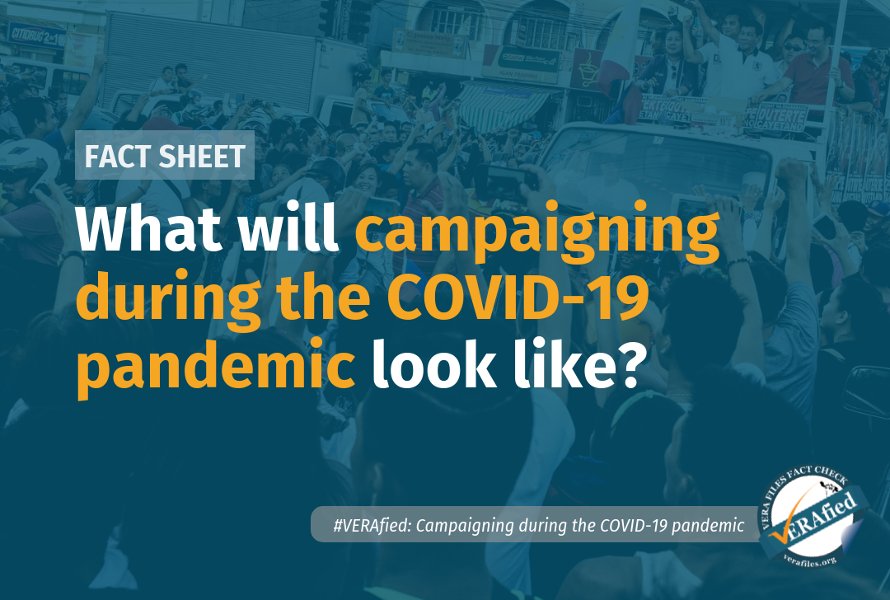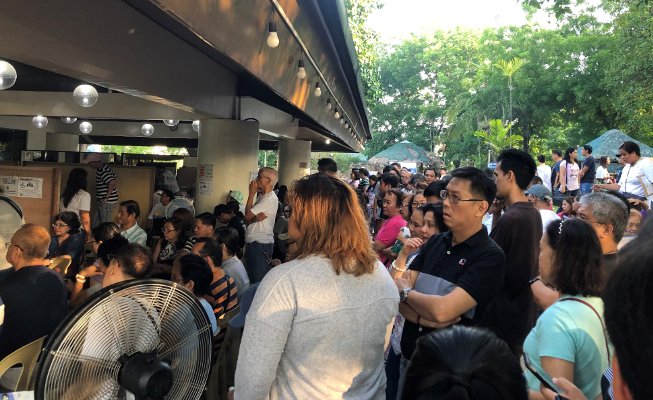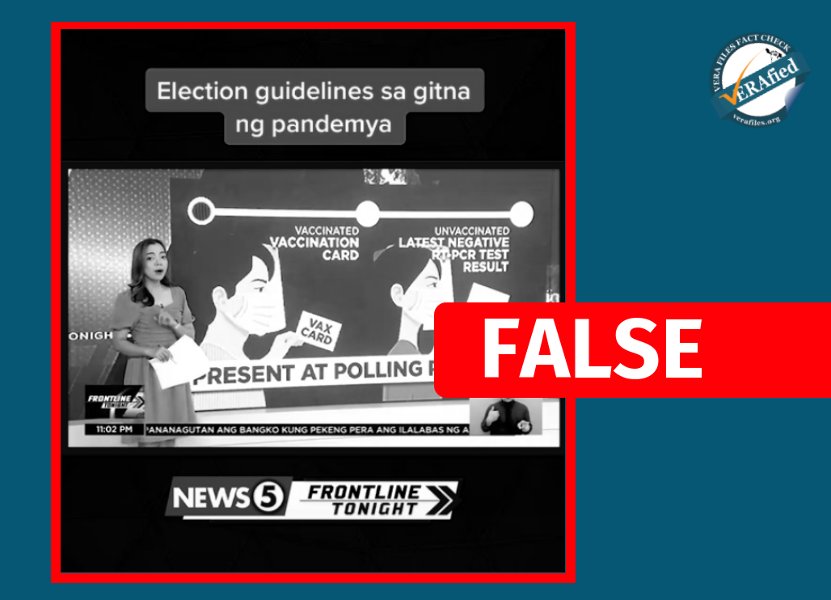Campaigning for the upcoming May 9 elections will be like no other in the country’s history because of the coronavirus disease 2019 (COVID-19) pandemic. Filipinos will vote for a new set of national and local leaders amid a raging pandemic that has claimed more than 50,000 lives, nearly crippled the economy, and challenged the competence of incumbent officials in addressing the public health crisis.
Unlike in previous elections, there won’t be the circus-like campaign activities of candidates, such as house-to-house visits and handshaking with voters, due to safety protocols to prevent the spread of the virus.
The official campaign period kicks off on Feb. 8 for candidates running for national positions – president, vice president, and senator – as well as for party-list representation in the House of Representatives. Those seeking local posts in the provincial, city, and municipal levels, including legislative district seats in the House, start theirs on March 25. They all have until May 7 – two days before election day – to court voters.
Here are some of the guidelines issued by the Commission on Elections (Comelec) for the orderly conduct of campaigning during the pandemic:
1. Limited campaign activities based on COVID alert levels
All campaign-related activities will be regulated based on a five-tier COVID-19 category level of Comelec adopted from the latest community quarantine classifications of the Inter-Agency Task Force for the Management of Infectious Emerging Diseases (IATF-MEID). Each category corresponds to limitations on in-person campaigning and venue capacity for caucuses, meetings, conventions, rallies, and miting de avance.
Comelec, based on Resolution No. 10732, will set up a National Comelec Campaign Committee (NCCC) that will determine the category level for each region, province, city, and municipality, subject to review every 14 days, or if deemed necessary.
There will be Comelec Campaign Committees (CCCs) per area that will approve applications for the conduct of campaign activities and monitor these, among other duties.
While the NCCC has the primary task of determining the category levels, CCCs in the municipal and city may raise these within their respective jurisdiction based on the number of COVID-19 cases and the rate of transmission in the area.
Given the category level system, candidates must obtain approval from every concerned CCC, and applications must be filed at least 72 hours before an activity. For example, presidential and vice-presidential candidates must seek the consent of the Regional CCC (RCCC), while gubernatorial and vice-gubernatorial candidates need permission from the Provincial CCC (PCCC).
2. Restrictions on campaign activities in the barangays
There will be minimum public health standards for strict compliance. Comelec-designated barangay officials and tanods, plus members of the Barangay Health Emergency Response Team (BHERT), should monitor compliance. The police and the military may coordinate with barangay officials in maintaining order and security.
After each activity, Section 26 of Comelec Resolution No. 10732 requires barangay officials and tanods to submit a report within 72 hours to their respective CCC. Every candidate or their representative must submit an affidavit of compliance with the campaign guidelines.
All CCCs must prepare reports regarding campaign activities in their jurisdiction for the duration of the campaign period.
3. Regulated online advertisements
Aside from traditional mass media (television, radio, and print), Comelec will also regulate campaign advertisements on the internet and mobile phones.
All candidates and registered political parties/coalitions had until Jan. 31 to register with Comelec’s Education and Information Department (EID) their verified official accounts, websites, blogs, and other social media pages used for political endorsement.
Comelec Resolution No. 10730 states that only registered accounts may run, boost or promote electoral advertisements. Microtargeting online advertisements to address users based on their preferences and personality is prohibited, except for geographical location, age, and gender.
Further, the commission will consider as additional official accounts those unregistered websites, blogs, or social media pages, “whether or not directly maintained or administered by the candidate or their official campaign representatives,” with the primary purpose of endorsing a candidate.
4. Comelec-organized online rallies every night of the campaign period
The Comelec EID will provide a platform for free live streaming of “e-rallies” of candidates for national positions beginning Feb. 8. The public can access these on the commission’s official social media pages every night of the campaign period.
The Comelec will allot three 10-minute slots every night for each presidential and vice-presidential contender. Five candidates for the Senate and five party-list organizations will each have a three-minute spot and 10 minutes each for three political parties.
Following the Jan. 28 raffle of Comelec, the first three presidential candidates to appear in the e-rally are Sen. Manny Pacquiao, Faisal Mangondato, and Norberto Gonzales. For vice-presidential contenders, Dr. Willie Ong, Manny Lopez, and Rizalito David will take their turn ahead of the others.
Candidates, political parties, or party-list groups may hold their own e-rallies on their social media platforms, which will not be covered by the limitations on broadcast advertising. However, they must comply with the following rules:
- All e-rallies must include a disclosure that identifies these as political meetings or rallies that should comply with minimum health protocols; organizers must provide relevant date, time, and location information.
- Recordings of e-rallies should be submitted to the Comelec EID within 72 hours from airing.
- Candidates may receive in-platform gifts and game currency, but may not give gifts or run promotions and campaigns that will award these to livestream audiences.
5. Prohibited activities during the campaign period
Comelec prohibits certain acts during the campaign period. These include campaigning on Maundy Thursday (April 14) and Good Friday (April 15). Candidates are not allowed to donate or give gifts in cash or in kind.
A ban on other activities has been in place since the start of the election period on Jan. 9 and will stay in effect until June 8. These include a gun ban, transfer or movement of personnel in the civil service, and suspension of elective local officials.
Have you seen any dubious claims, photos, memes, or online posts that you want us to verify? Fill out this reader request form.
Sources
Commission on Elections (Comelec) resolutions
- Resolution No. 10748, Dec. 16, 2021
- Resolution No. 10747, Dec. 16, 2021
- Resolution No. 10742, Dec. 16, 2021
- Resolution No. 10732, Nov. 24, 2021
- Resolution No. 10730, Nov. 17, 2021
- Resolution No. 10728, Nov. 10, 2021
- Resolution No. 10695, Feb. 10, 2021
Official Gazette, Guidelines for Nationwide Alert Level System as of 18 Nov 2021, Nov. 18, 2021
Department of Health, Case Bulletin No. 688, Jan. 31, 2022
Campaign S ● A ● F ● E ● COMELEC e-Rally Channel, homepage, Accessed Jan. 31, 2022
Campaign S ● A ● F ● E ● COMELEC e-Rally Channel, (results of the virtual raffle), Jan. 30, 2022
(Guided by the code of principles of the International Fact-Checking Network at Poynter, VERA Files tracks the false claims, flip-flops, misleading statements of public officials and figures, and debunks them with factual evidence. Find out more about this initiative and our methodology.)




